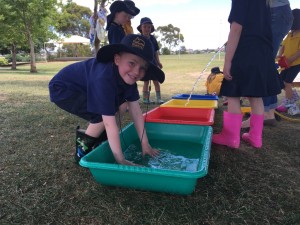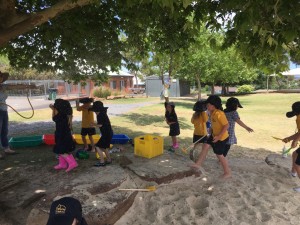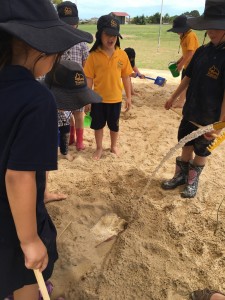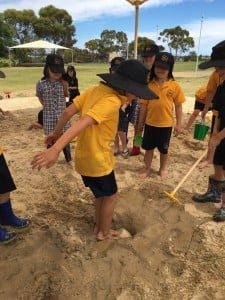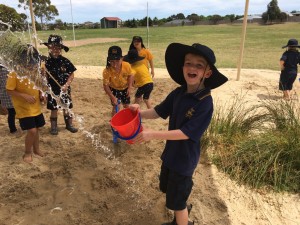As part of our History discovery Reception classes investigated toys that our parents and Grandparents played with.
We discovered some familiar toys that continue to be popular throughout the generations … and some fun old discoveries.
Each year as part of Woodend’s Transition program, we conduct school-to-kindy and kindy-to-school play visits. Reception children visit the Woodend Children’s Centre to reacquaint or meet the teachers, children and the learning space and in Term 3, our Reception classes are hosts to the kindy children. It is often a very engaging experience for ex-Woodend Children Centre children as they love to meet up with their teachers again, their kindy friends and return to play spaces that provided fond memories.
In Term 3, the kindy children have the opportunity to visit our Reception classrooms. They meet the teachers and children and experience our learning spaces both inside and out. We also enjoy having Trott Park Kindy children visit us this term or in Term 4.
During Term 4, the kindy children also have formal Orientation visits where they spend time in their 2019 classroom and meet children from other prior-to-school settings. We believe this aspect of the Transition program assists the kindy children to gradually transition to school and to develop familiarity with our school environment.
Recently, Room 5 visited Woodend Children’s Centre and in the coming weeks will be Rooms 5, 27 and 18.
In between showers on the morning of Thursday 7 September, we celebrated the official opening of the Outdoor Shop Fronts. The students had the opportunity to meet members of the Grounds Committee who were instrumental in making the shops. These members worked tirelessly to design, build and erect this structure, one being Roger Beasley, who built the structure, drew up a plan (based on the student’s suggestions) and painted the designs. Ably assisted by Simon Cheney, Brett Simes, Ken McTaggart and welding expert, Bob Middleton-Frew the metal frames were attached to the shop fronts and surrounds were paved. To complete the area, volunteer, Ashley Farrell and SSO, Sharyn Paris finished the tables and tidied the area to prepare it for the opening. A big thank you to these important people at Woodend as without their collective efforts, the students would not have the opportunity of this new and fun play space. The students came up with many ideas for using the nature play items creatively and safely. If parents/carers have access to any safe and free nature play items that students can use in the shops, we would be grateful of these donations.
Construction of the outdoor play shop frontages is underway outside Room 10 adjacent to the garden. Metal framework has been made ready for the fronts to be attached and paving put down. We were fortunate to have several hours of clear skies before the weather set in. Big thank you to Ken McTaggert (grounds person), Roger Beazley, Brett and Mitchell Simes, Simon Cheney, and Bob Middleton-Frew for working for majority of Sunday on this area. Soon there will be photos of the completed project. This will be very exciting outdoor play space for our students.
We are going to offer over-the-counter items as a trial on a fortnightly basis. We are hopeful the students and staff trial and enjoy them.
Starting next week (Week 9) we will be selling:
Why don’t you give these a try and let us know what you think! We welcome your feedback
Please pack come money to try these items next week!
[embeddoc url=”https://wpsnewstarters.edublogs.org/files/2017/02/Volunteer-Induction-workshops-2017-12nf27v.pdf” viewer=”google”]
Meet our Teachers and other Parents and Caregivers (and students)
Monday 13 February
While teachers have already met quite a number of parents and caregivers, we do look forward to having the opportunity on Acquaintance Night to meet with all families together to communicate our vision for our learners and information about curriculum, routines, expectations and organisational matters. Some teachers will also have their students actively presenting information during Acquaintance Night. We also see Acquaintance Night as an opportunity for adults to meet each other and develop a sense of belonging to a new network of families. We hope new people are able to meet families and feel a little more welcomed into our community.
Acquaintance Night Meeting Times:
R-2 : 6.30 pm – 7:00 pm
Yrs 3-5 : 7.05 pm – 7.35 pm
Yrs 6/7 : 7.40 pm – 8.10 pm
We know there will be some doubling up for some families; making it difficult to attend one or more of the scheduled meetings. If this is the case for you, please be assured that teachers are happy to catch up with you at other times to clarify vision for their learners, routines and expectations.
Please Note:
This is not a time to discuss individual student’s needs. As always if you need to discuss any matter with your child’s teacher you are most welcome to make an appointment.
Specialist teachers and leadership team
The specialist teachers and leadership team will be available in the gym during the evening, where tea and coffee will be on offer. If you would like to speak with one of the specialist teachers and are unable to touch base on the night, please phone the school to arrange a mutually convenient time. Specialist teachers will post information on the blog in the coming weeks about their programs this year.
Please move promptly to the next class if you are attending more than one session.
Our teachers are looking forward to meeting you!
It is hard to believe that the first week has gone! The new Reception children have successfully managed their first week of school life. The parents/carers and Reception teachers have benefitted from some quality time to talk about their child and about the year ahead.
We enjoyed meeting you at Monday’s “Cheers or Tears” parent/carer get together. We didn’t have to get many tissues ready but instead had a beverage and enjoyed the company of others experiencing the kindy/school transition for 2017. We had the opportunity to meet Mr Steve Freeman, our new Principal, Pamela Hansen, our new School Chaplain, members of the Leadership team, Governing Council and Parent Network. We had a very positive turn-out and trust that this will set the tone for many school community events throughout the year ahead.
We thank parents/carers for preparing your child to:
and for parents/carers themselves to:
We are most appreciative of your involvement in your child’s start to school and we hope that you build a sense of connectedness within our school community.
Here is the ‘Welcome to new families’ parent information session that was conducted by Brian Marshall and Cathie Luke at the first Orientation visit last Thursday 1 December 2016. This may be helpful if you were unable to attend or you would like to reference some sections.
Our second and final Orientation visit is this Thursday 8 December and your child is in the same session as last Thursday. Parent/carers do not need to stay for the 90 minutes.
[embeddoc url=”https://wpsnewstarters.edublogs.org/files/2016/12/Transition-keynote-2016–1kqsk99.pdf” viewer=”google”]
What do we mean when we talk about executive functions? What are they? What do they mean for my child starting school? How can I help my child continue to develop these executive functions? This article explains the eight key executive functions. We hope you find this useful.
It is soon time for Woodend’s Orientation visits for new Reception children. We welcome and look forward to meeting children and families visiting our school. The children and parents/carers will have an opportunity to meet the leadership team, spend time in their classroom and with their 2017 teacher/s. This will take place on Thursday 1 December and Thursday 8 December 2016.
For some children starting school it can be exciting and fun, for some it is approached with caution, and for others it is an anxious time. Our team of Reception teachers, School Service Officers and leaders are well aware of the varying emotions that come with changing learning environments and we also know that transition to school takes time. We look forward to and work hard at building warm and positive relationships with each child and family. Our ‘Building Connections Conversations in Term 1 Week 1 provides us with that opportunity to find out more about your child from you that assists us to better accommodate for your child’s needs.
Transitioning to school requires a partnership – the partnership of the teacher/s, the child and the parents/carers. In every way possible we work to effect a smooth transition for your child. Together we want your child to feel comfortable, valued and develop a sense of belonging and identity within their friendship group, classroom and school. There are many ways we, together, can support your child to transition smoothly. One resource, Kids Matter ‘Thinking about Transition to School’ information sheet written by Jane Godwin provides valuable tips. We hope you find this information sheet useful.
If you have any questions, please do not hesitate to contact the school, post a question, or speak to a member of staff at the Orientation visits.
Here at Woodend we have a Healthy Eating Committee. At our first committee meeting for the year, we worked on defining our purpose and directions. This is our purpose:
Healthy eating and drinking at Woodend Primary School is about improving the health and wellbeing of our children. We can do this by:
We reference the Government of South Australia’s Right Bite Healthy Food and Drink Supply Strategy for South Australian Pre schools and Schools to ensure we are consistent with the recommended guidelines.
Our committee consists of canteen staff, parent volunteers and representatives of school leadership. Student volunteers support the canteen program. We also consult with students during times of planning and decision making.
We avoid marketing commercialized products where possible. We aim to promote produce that is freshly made to families.
In our efforts to continually improve our choices on our ‘Woodies Goodies’ menu we will let you know items that we have available or are about to trial. We are always in need of volunteers to assist us prepare more nutritious and healthy choices. If there is any day of the week that you can spare 15 minutes, 30, 45, 60 or 90 minutes – any amount of time, we would be very grateful of your help. All you need to do is call in at our canteen or let front office staff know of your interest. Our friendly canteen staff are: Helen Lewis, Di Thomas and Lee Francis. They would be very welcoming and happy to see you volunteer in the canteen!
Two recent snack items we have available are:
You can encourage your child to buy one and give them a try! They are nice and cold and taste delicious especially on a warm day. We look forward to seeing you as a volunteer and or your child coming to buy at our canteen.
TRANSITION – students and their families developing a sense of identity and belonging.
The world is different. Students enrolling at Woodend in the Year 2016 graduate in Year 7 in 2023 and will complete Year 12 in 2028. Ponder this. Questions? So what – now what? Since 1990 all of these technologies were available. Imagine what will be available for creating, collaborating and consuming for our students in 2028 when these students graduate?
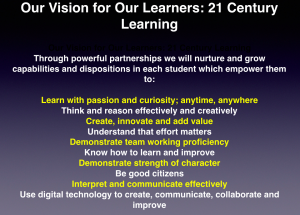 we’re looking for different things … new skills and literacies….
we’re looking for different things … new skills and literacies….
solutions, information, global, creativity, media and collaboration literacies as well as digital citizenship encompass the essential skills our students need to live and work successfully in the future.
The Early Years Learning Framework contained five outcomes which clearly addressed key areas in prior-to-school settings – identity, connecting and contributing, the importance of wellbeing, being confident and involved learners and effective communicators. These five outcomes are contained within our Australian Curriculum, in particular the General Capabilities (see white font on graphic).
The General Capabilities is a key dimension of the Australian Curriculum that encompass the knowledge, skills, behaviours and dispositions that together with the content of each learning area, assist students to function as learners in the 21st Century.
We are on a continual journey of improvement. We want to be able to support, nurture and build those new skills and literacies and have used recent research in the area of TRANSITION to do things differently. In consultation with prior-to-school settings we have worked with the seven essential principles that guide our practice with transition. In particular, giving attention to building relationships that support …
A STRONG SENSE OF IDENTITY
A FEELING OF BELONGING
HEALTHY DISPOSITIONS FOR LEARNING
We acknowledge and address the following principles. Transition is:
1. long and complex process during which the child internalises the process of leaving their prior-to-school setting and moving to a new environment
2. is ongoing – building a sense of identity and belonging
3. we are all making adjustments to help your child belong
4. takes place over time as each child – build on his / her identity
5. each child brings their own sense of being and belonging from home and prior to school settings
6. educators working together to build upon each child’s learning experiences with a focus on continuity of learning experiences and on ‘Play’. Children MUST play. You will see your child engaging in times of ‘free play’ which is their therapy and also times of ‘intentional play’ where there are links to the General Capabilities and learning outcomes within the Australian Curriculum. During play your child is learning new skills, constructing meaning and making greater sense of his/her world.
7. ongoing discussions – building relationships – partnerships
‘It takes a village to raise a child’ (African proverb) – it is the partnerships required during the maturation of our youth. We are all this “village” and has never been more necessary than it is today. We live in a face-paced, instant information, and pressure-packed world. Today’s children are faced with a myriad of both challenges and opportunities. Navigating parenthood can be a daunting undertaking – home/school/community partnerships and supports are welcome and necessary to prepare our students for tomorrow.
What is your child thinking/feeling/saying about starting school? We recognise that all children begin school visits and school with different experiences, needs and energy levels. Does your child need to:
– visit the school on the weekend?
– come for one extra orientation visit?
– do you need to develop a social story (photos of school) to look and prepare for school whilst on holidays?
Decide on what best suits your child to help them orient into school and transition more smoothly. Please contact us if your child needs more support to transition.
We recognise your child brings with him/her a rich and varied array of experiences from all facets of life.
Our ‘Building Connections’ conversations allow our Reception teachers to find out more about your child – their experiences, learning dispositions, strengths, personal and social capabilities and their home and community context. This is another element of the transition process. We also have:
– Acquaintance Night early in Term 1
– Parent/Teacher/Child discussions end Term 1/early Term 2
– Mid and End of Year Student Report
– ongoing informal discussions between parent/carer and teacher throughout the year when required. We monitor how your child is transitioning and work in partnership with you to ensure s/he is managing the change and building their own identity and sense of belonging. So too with you, we are wanting to ensure that you and your family are managing the change and in time, become a valued part of the rich fabric of our Woodend Community. How can this occur?
PARENT ENGAGEMENT
1. Parent Engagement is about you learning about learning. Come in, read, share learning with parents so that you better understand the learning that occurs at school in 2016 and beyond.
2. Support your child’s learning – meet the teacher/s and parents within your child’s classroom. Ask questions, read, and collaborate so that you know what is happening in your child’s school life and feel an active part of it.
3. Become involved in committees, events and social activities made available to you. We value your ideas and input to “grow” our community of learners – adult and child. In this way we build the capacity of the school through parent/carer voice and action. We are responsive to yours and the communities’ needs as you involve yourself.
4. Embrace the opportunity to network with others – collaboration is one of our greatest strengths as a community. You may network by being present and involved at school or via communication channels set up by the school. School is also a wonderful opportunity to develop friendships – sometimes life long friendships. Make every effort to connect with parents/carers.
Here are the key school times:
Communication options:
Newstarters Blog – this can be found on www.woodendps.sa.edu.au under the Organisation tab and has all the information you require – Attendance and Departure, Uniform, OSHC and much more. Please subscribe and you will receive a notification of new information being posted.
We hope that this information is valuable to you. Please do not hesitate to contact the school if you have any further questions.
We look forward to building partnerships with you and your child.
Year 2 students helped make the Atrium Cafe come alive by making a few additions, cleaning and changing the space. Additions include: writing paper, writing pens and pencils, whiteboard and markers, clipboard, digital timer, phone book and cash register so as to enrich the literacy and numeracy experiences through play. We look forward to the new Receptions visiting us on Thursday and hope they get to see it on their tour. Thank you Room 20 for helping.
This afternoon squealing and laughter could be heard in the sandpit on the oval as Room 5 Receptions had the opportunity to get all wet! The water play afternoon was in response to the children’s interest in water and jumping in puddles after recent rains. Supported by parents the children had the opportunity to explore the properties of sand and water, mud and water, cement and water, and also clothing and water. Mrs Ogilvie continually questioned the children so they could think about, explore, investigate and problem solve using these materials … and in the meantime, have fun! 